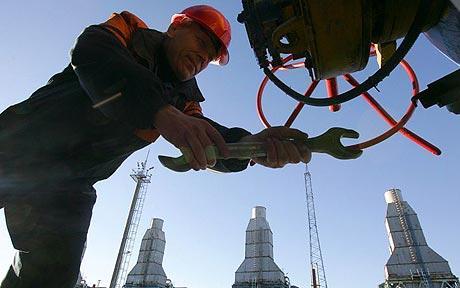
RUSSIA AGREE

Ukraine and Russia resolved their natural-gas feud on Thursday in a hard-fought deal that averts the threat of gas shortages in Europe this winter.
The deal was sealed after months of intense negotiations brokered by the European Union, which relies on Russia for more than a third of its gas imports, half of which is piped through Ukraine. Unless Ukraine paid for its gas supplies upfront, Russia had said it wouldn't reopen taps it shut off in June, a move that threatened to leave many homes in Ukraine and parts of Europe without enough heat this winter.
Officials said they hoped the breakthrough would herald a broader thaw in relations between Moscow and Kiev.
"These were tough but very professional negotiations," said the EU's energy chief, Günther Oettinger, who mediated the talks. "It is also a contribution to the de-escalation between Russia and Ukraine."
Under terms agreed to on Thursday, Ukraine will guarantee payments to Russia in exchange for gas deliveries until March. It will pay $3.1 billion to settle some of its debts to Russian gas monopoly OAO Gazprom , as well as making an additional upfront payment of $1.5 billion for deliveries of gas for November and December.
Russian Energy Minister Alexander Novak said one of the compromises made by Moscow included lowering the price it had originally demanded by $100 per thousand cubic meters. Kiev will now pay $385 per thousand cubic meters for gas purchases up until January and $365 per thousand cubic meters between January and March.
Gazprom said it hoped the agreement would mark "the start of a new, more constructive chapter in gas relations among the EU, Russia and Ukraine."
The current dispute was triggered after Russia nearly doubled Ukraine's gas price in April following the ouster of Ukraine's pro-Kremlin government. Gazprom cut off deliveries to Ukraine over the summer because of the size of Kiev's overdue gas bills. Similar disputes in 2006 and 2009 led to natural-gas shortages in Ukraine and several EU countries.
Russian gas accounted for 39% of EU's natural-gas imports last year, with around half of those supplies flowing through Ukraine.
The agreement marks a coup for Mr. Oettinger, who is due to leave office at the end of the week and who fought hard for months to broker a deal ahead of the winter. His colleague, European Commission President José Manuel Barroso, also leaned heavily on Kiev late on Wednesday night, calling President Petro Poroshenko several times.
"This is an important step for our shared energy security in Europe," said Mr. Barroso. "There is no reason for people in Europe to stay cold this winter."
The short-term gas deal underscores the close economic ties that bind Europe, Russia and Ukraine despite the conflict in Ukraine. It comes on the eve of a changeover in Brussels: a new European Commission team takes office this weekend under former Luxembourg Prime Minister Jean-Claude Juncker, who has had warm relations with Russian President Vladimir Putin in the past.
The agreement, though, comes in the same week that the EU decided to keep in place its current sanctions regime against Russia. There are also growing concerns within the bloc about Russia's intention to recognize parliamentary elections taking place in separatist-held regions of eastern Ukraine.
Kiev's lack of money to pay for the gas emerged as the key hurdle to a deal during talks last week. Officials said Ukraine would now be able to make up the shortfall through a variety of sources.
Ukraine's state energy company, Naftogas, will pay its $3.1 billion debt to Gazprom with money it has already received from the International Monetary Fund.
The $3.1 billion debt payment will come from a special fund managed by Naftogas, under Ukraine's IMF program.
Mr. Oettinger said the additional funds for gas prepayments in coming months would come from Naftogas's own revenue, money coming due to Ukraine under its IMF program, and its deals with the European Commission.
Mr. Oettinger stressed that the EU would not provide any specific financial guarantees, which Moscow had requested. He said, however, that the commission was working on a new package of loans to Kiev, which would come on top of €760 million ($958 million) that it will receive by the end of the year.
Ukraine asked the EU early this month for an additional €2 billion for the new package although many Brussels officials say that figure is unrealistically high.
Ukraine is also due to receive $500 million from the World Bank by December, and officials confirmed that Kiev will be able to channel some of the aid it has already received from the IMF into gas payments if needed.
wsj.com




